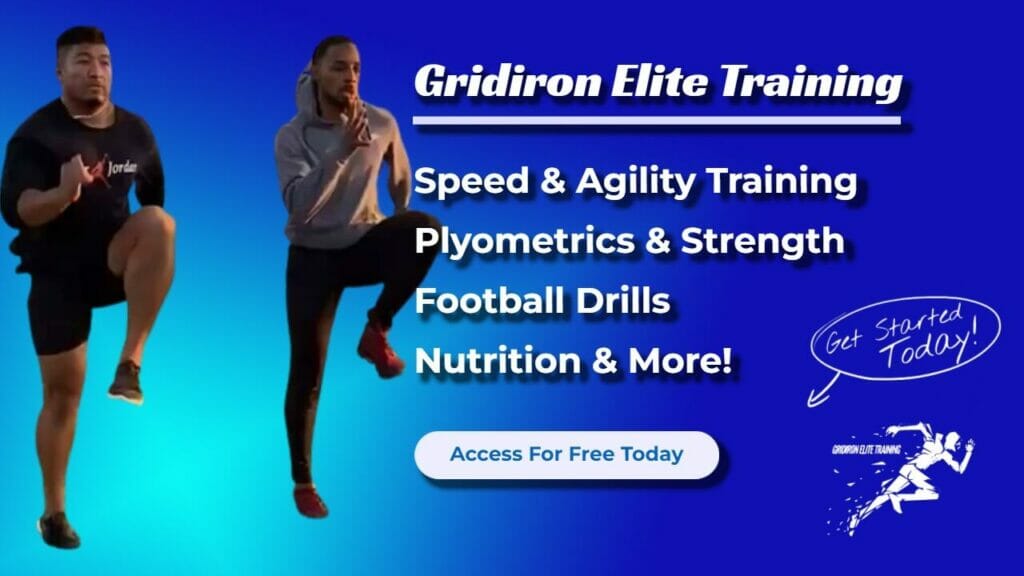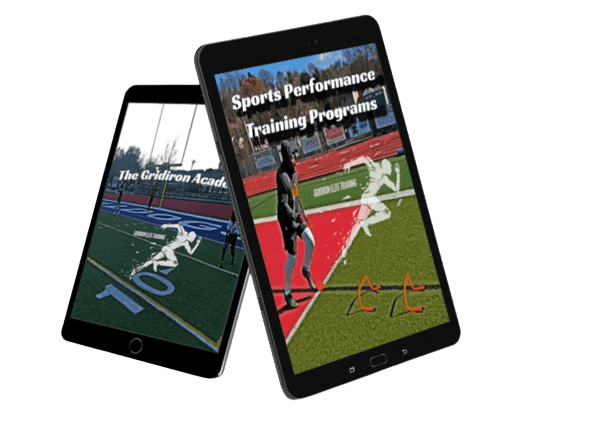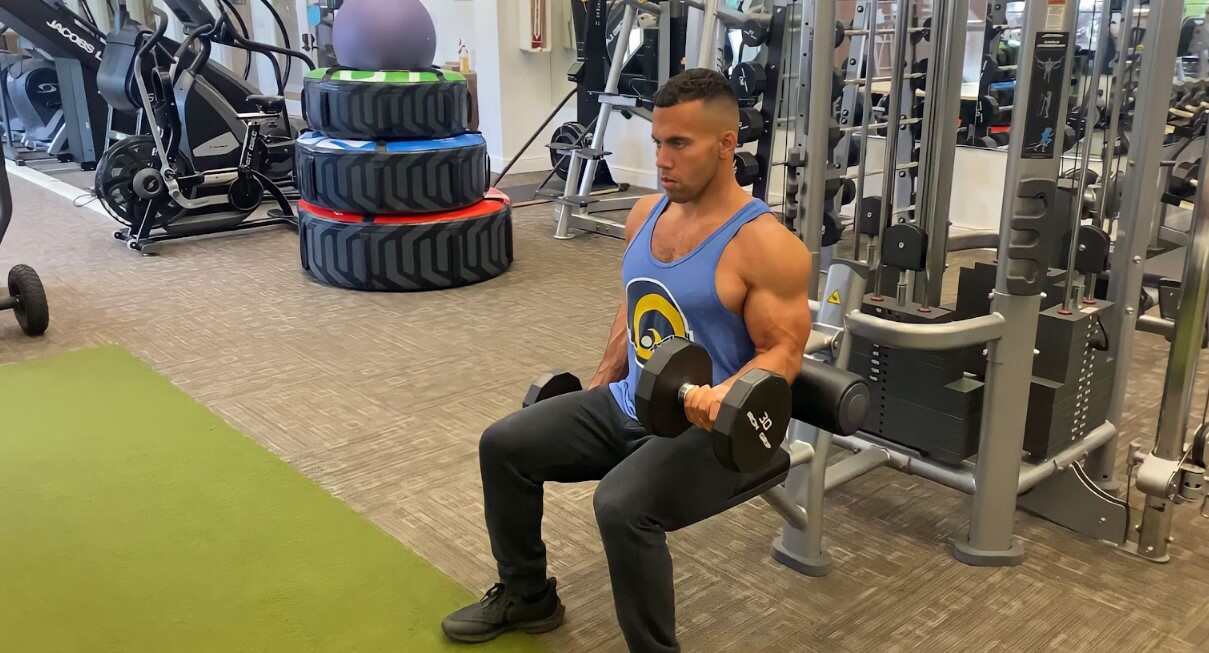
Benefits Of Weight Training For Football
Written By: Gridiron Elite Training

Benefits Of Weight Training For Football
Written By: Gridiron Elite Training
The Ultimate Guide to Football Weight Training: How to Train, What to Eat, and Other Tips
Weight training is a must for football players. It helps them build muscle and increase their strength. It also improves their performance on the field. Football players must be strong to tackle, block effectively, and run with the ball. They need to sprint, jump, and change direction quickly too.
Weight training builds muscle mass, increasing strength, power, speed, agility, and endurance. You should train three to four days a week as a football player. Try to include full-body workouts, plyometrics, and speed training in your routine.
Football players also need to ensure they eat a diet with the nutrients they need for endurance and recovery, including protein, carbs, calcium, iron, and zinc.
Football players listen to how their body feels on any given day and ensure they are not exercising the same group of muscles in back-to-back sessions. This is because the muscles need time to rest between workouts and can be at a higher risk for injury if they are overworked.
It is also crucial for the players to know how much weight they should be lifting and how often they should be doing it.
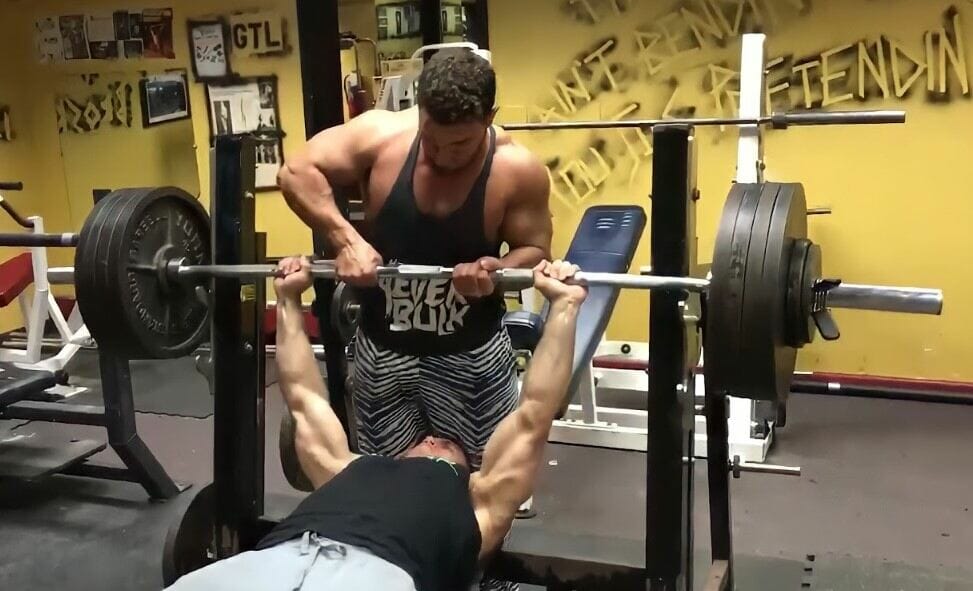
Benefits of Football Weight Training & Proper Weight Training Technique
A weight-training program’s purpose is to strengthen the muscles and increase muscle size, which can help you become faster, more powerful, and more agile on the field.
Remember to focus on form and technique when weight training. This will help you avoid injury and will allow you to get the most out of your workouts.
Increased Strength
Football is a physical sport that requires a lot of strength. Weight training can help you build the muscle you need to hit harder, run faster, and tackle better.
Improved Power
Football players need to be explosive to make quick movements on the field. Weight training can help you develop the power you need to make those explosive movements.
Better Endurance
Football games are long, and players need to be able to maintain their performance throughout the game. Weight training can help you build the endurance you need to keep going for the full 60 minutes.
Tips for Football Weight Training
Focus On Compound Exercises
Compound exercises work for multiple muscle groups at once and are great for building overall strength. Examples include squats, deadlifts, and bench press.
Incorporate Plyometrics
Plyometrics are explosive exercises that can help you develop power and speed. Examples include box jumps, jump squats, and power cleans.
Vary Your Workouts
It’s important to change up your workouts regularly to prevent boredom and to challenge your muscles in different ways. Try adding new exercises, increasing the weight or reps, or changing the rest periods between sets.
Don’t Neglect Cardio
While weight training is important, cardio is also crucial for football players. Incorporate running, sprints, and other cardio exercises into your routine to improve your endurance.
The following are some exercises to help improve your football weightlifting form:
Squat
Stand with your feet shoulder-width apart, toes pointing forward or slightly outward.
Keep your back straight and bend at the hips, not the waist, until your thighs are parallel to the floor or lower if you can do so without rounding your back.
Push up through your heels to return to starting position and repeat as desired.
| Preview | Product | Rating | Price | |
|---|---|---|---|---|

|
Fitness Reality Squat Rack Power Cage with | Optional Lat Pulldown & Leg Holdown Attachment | Squat... | No ratings yet |
$249.00 |
Buy on Amazon |
Deadlift
Deadlifts are performed on either a trap bar or with plates on both sides of a regular barbell. The hands are positioned slightly wider than shoulder-width apart. Grip the bar so it rests across the palm and fingers rather than in between them.
The feet should be about shoulder-width apart, with toes pointed out slightly. The torso is generally kept relatively upright.
Deadlifts are similar to squats, using similar muscles and movements but emphasizing the posterior chain (glutes and hamstrings) instead of the quadriceps. In a deadlift, the weight is lifted off the ground by bending at the hips and knees. The knees do not fully extend, and the hips stay over the knees.
| Preview | Product | Rating | Price | |
|---|---|---|---|---|

|
CAP Barbell Olympic Trap Bar, Hex Bar, Shrug Bar, Deadlift Bar, Black, 50 inches | No ratings yet |
$58.00 |
Buy on Amazon |
Power Clean
The power clean is a weightlifting exercise used to develop the lower body muscles, especially the quadriceps, hamstrings, and glutes. It also strengthens the upper body and core.
The barbell should be gripped in both hands with palms facing down and arms extended in front of you at shoulder height. The feet should be shoulder-width apart with toes pointed out slightly.
The power clean starts by bending at your hips while keeping your back straight until you are in a squat position with the barbell on the floor. Then, explosively push up your legs and arms while simultaneously swinging the barbell to your upper chest. Once there, stand up straight again to complete one repetition.
Bench press
The bench press is a compound exercise that simultaneously works for several muscle groups. The primary muscles worked are the pectorals, chest muscles, anterior deltoids, and shoulder muscles. The secondary muscle groups include the triceps, biceps, and forearms.
Bench pressing can be done with dumbbells or a barbell. Dumbbells are easier for beginners because they allow for more natural movement of the wrists and elbows than a barbell.
Lie on your back on a flat bench to perform the bench press. Place your feet on the floor and your knees bent at 90 degrees. Hold the barbell with both hands about shoulder-width apart and lower it to just above your chest. Keep your elbows close to your body and lift the barbell off of its rack by straightening your arms.
Lower it to your chest. Pause for one second before pressing it back up again. Repeat this motion until you have completed the desired repetitions.
| Preview | Product | Rating | Price | |
|---|---|---|---|---|

|
Marcy Olympic Weight Bench Incline for Full-Body Workout MD-857, Grey/Black | No ratings yet |
$299.98 |
Buy on Amazon |
Weightlifting form and proper technique can make a significant difference in the outcome.
Before starting any weight training program, it is crucial to have a good understanding of the weightlifting form and technique. Weightlifting can be a dangerous activity if done improperly.
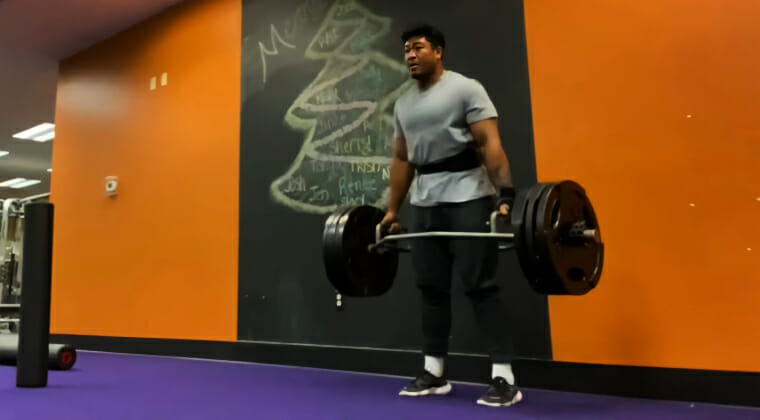
What Should You Eat Before & After Your Football Football Weight Training Workout?
One of the most important things you can do before a football workout is to ensure that you eat the right foods. It will help you to have more energy, and it will also help your body to recover from the workout.
But what should you eat?
The goal of a pre-workout meal is to provide the body with the nutrients it needs to do its job.
A pre-workout meal should be light and easy to digest. It should contain carbohydrates, protein, and fat.
You should avoid eating anything too heavy or spicy for at least two hours before your workout.
Drinking plenty of water before, during, and after your workout is also essential.
When it comes to pre-workout meals, many options work well. For example, some people like to eat a banana with peanut butter or Greek yogurt mixed with protein powder. Other people want to drink chocolate milk or even try a protein shake before they start their workout. The best thing about these pre-workout eats is that they give your body fuel for energy and carbs that can help your muscles recover after the training.
After your football workout, you must refuel with good food as soon as possible. So what is the best food to eat after a football workout? After a workout, people refuel with a protein shake because this drink has both carbs and protein. If you are worried about gaining weight from consuming too many calories after your football workout, stick to whey protein and some fruit in your shake.
The Importance of Weight Training For Football
Football weight training is essential to any athlete’s routine, and football players are no exception. Weight training is vital for football players because it helps them improve their strength, endurance, and speed. To maintain the strength and power they need to succeed on the field, they need to train their bodies in a way that will allow them to do this.
It can help players to stay healthy and improve their performance on the field. It also has many benefits for the body and mind.
Football weight training can be done at home or in a gym. For beginners, it’s recommended to start with bodyweight exercises and then gradually add weights as they get stronger.
Suppose you need more workouts for your strength and conditioning training. In that case, you can read our latest posts on “The 5-Step Full Body Football Strength Workout to Get Stronger and Prevent Injuries” and “Strength Training Exercises – Workout For Football Players.”
You can access our sports performance training programs, football drills, workouts, and the Gridiron Recruiting Center inside “The Gridiron Academy” to help you with your football recruiting.
Subscribe To Get Updates On Newly Released Articles
Don't forget to share this post!
Continue Reading More Football Training Tips Below
Related Articles
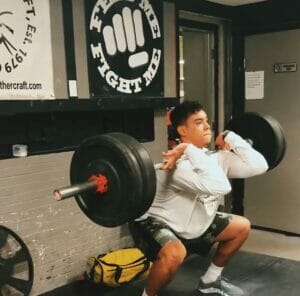
How To Build Leg Strength For Football
Learn how to increase leg power for football. Find out how to strengthen hamstrings, quads, and hip flexors so you can play at your best on the field.
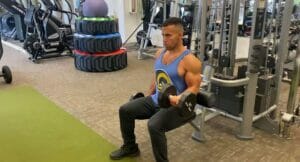
Benefits Of Weight Training For Football
Football weight training. Learn the benefits of weight training for football and why it’s important for athletes to keep the body healthy.
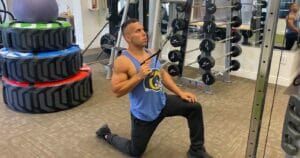
The 5-Step Full Body Workout For Football Players
A full body workout for football players, including exercises for the lower body, upper body, and core.

Gridiron Elite Training was started to help educate and provide football players with a community to receive proper training and guidance.
We created “The Gridiron Elite Academy” which is an online football performance network that provides football players of all levels with sports performance workout programs, football position-specific drills, mindset coaching, mental toughness training, recruiting guidance and help, and nutrition programs.

